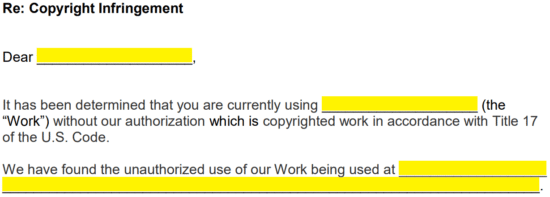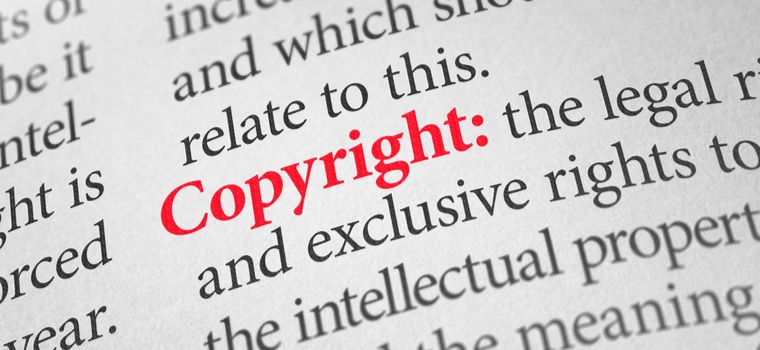
Have You Received a Letter from Higbee & Associates, PicRights, David Oppenheimer, KodakOne, Pixsy, Photoclaim, or another Copyright Owner?
Many small business owners find that receiving a copyright demand letter from Higbee & Associates can be an unnerving experience. The demand letter from the law firm of Higbee & Associates most likely accuses the recipient of copyright infringement, or, at the very least, of using the work represented by a copyright owner improperly.
If you have received a cease-and-desist or demand letter from any of these entities, please contact us at anthony@vernalaw.com or call us at 914-908-6757.
Understanding the appropriate steps to take can help you navigate the situation with confidence. In this article, we’ll provide valuable insights on how to possibly respond effectively to a Higbee & Associates copyright demand letter. Remember that not all situations will require all solutions and this list may be incomplete. If you have any questions on the Higbee & Associates copyright demand letter you received, you may contact us for confidential attorney-client legal advice at anthony@vernalaw.com or 914-908-6757.
- Start with a Polite Acknowledgment: When you receive a copyright demand letter from Higbee & Associates, it’s essential to respond promptly and professionally. Begin by acknowledging the letter and expressing your understanding of the concerns raised. Remember to maintain a polite and respectful tone throughout your response.
- Review the Alleged Copyright Infringement: Thoroughly analyze the claims made in the demand letter. Take the time to review the copyrighted work and compare it to your own content. Assess whether there are any similarities or instances of infringement. This evaluation will help you formulate an appropriate response.
- Ask for their copyright registration number and certificate if you’ve communicated with them.
- Consult an Attorney: Dealing with copyright matters can be complex, and seeking legal advice is highly recommended. Consult with an experienced intellectual property attorney who can provide personalized guidance based on your specific situation. They can review the demand letter, assess the strength of the claims, and help you develop a suitable response strategy. Here at Verna Law, PC, we can help you respond. Just send an e-mail to anthony@vernalaw.com or call us at 914-908-6757
- Consider Fair Use and Other Affirmative Defenses: If you believe your use of the copyrighted material falls under fair use, ensure that you clearly articulate this in your response. Fair use allows for the limited use of copyrighted works without permission in certain circumstances, such as criticism, commentary, or educational purposes. Your attorney can assist in assessing whether fair use applies to your situation. Other affirmative defenses include Independent Development or lack of ownership of a registered copyright.
- Craft a Detailed Response: Compose a comprehensive response that addresses each point raised in the demand letter. Provide a clear explanation of your position, highlighting any factual or legal defenses you may have. It’s crucial to remain concise and organized while emphasizing your commitment to resolving the matter amicably.
- Document Preservation: Preserve any relevant evidence related to the alleged infringement, including copies of your content, timestamps, and any communication exchanged with Higbee & Associates. This documentation can serve as valuable support in case the issue escalates further.
- Consider Settlement Options: Higbee & Associates may propose a settlement to resolve the copyright dispute. Evaluate the terms carefully and consult your attorney before making any decisions. They can help you negotiate a fair resolution that protects your interests.
- Review Your Online Presence: While addressing the copyright issue, take the opportunity to review your overall online presence. Ensure that your website and other platforms comply with copyright laws. Regularly check your content for potential infringements to mitigate any future risks.
Receiving a copyright demand letter from Higbee & Associates can be daunting, but with the right approach, you can handle the situation effectively. By acknowledging the letter professionally, seeking legal counsel, evaluating fair use and other affirmative defenses, and crafting a detailed response, you can navigate this process with confidence. Remember to preserve relevant documentation and consider settlement options, all while maintaining compliance with copyright laws. With these steps, you can address the issue proactively and protect your rights.
The Higbee firm represents clients such as Agence France-Presse, PicRights, the world’s largest news agencies, and other companies that represent numerous photographers. Because of a reverse-image search, many business owners receive a demand letter regarding copyright claims. The letters of demand do ask for damages because of the allegedly infringing use of the copyrighted photograph(s).
Why do we at Verna Law, P.C., take this path when a client of ours is the target of the letter? Many commentators state that the Higbee & Associates firm acts as copyright trolls or a copyright scam. We refuse to take that stance in any copyright enforcement. We do believe, however, that one must review this demand letter properly and we do review the possibility of any unauthorized use of a copyrighted photograph. That said, there are still elements of a copyright infringement matter to review.
Copyright infringement is the unauthorized use of a work that qualifies under the Copyright Act for copyright protection. Unauthorized use means that the permission of the copyright owner was not granted for the use.
Copyright Infringement is the taking of rights that a copyright owner has without permission:
- Right to create copies of a work
- Right to sell copies of a work
- Right to publicly perform the work
- Right to license the work
- Right to create derivative works of the original work
17 U.S.C. § 501
An unauthorized use of copyrighted material in any of the above situations violates the exclusive rights of the copyright holder and is copyright infringement.
Copyright protection exists at the creation of a work that qualifies under the Copyright Act. The ability to litigate a copyright infringement claim in federal court, however, can only come after the copyright registration is recorded in the Library of Congress.
Registering the Copyright is a Requirement
As stated here many times, a copyright registration from the U.S. Copyright Office of the Library of Congress is required before a copyright infringement legal action may be filed. Copyright notice (by use of the c-in-a-circle logo on a work) is not required. The registration is required in order to show the ownership of the copyright properly and that ownership must match the registration certificate – any assignments or transfers must also be registered. The valid copyright is required in the United States – which is atypical when looking at copyright law around the world.
Copyright ownership comes from the creation of the work that qualifies under the Copyright Act. Enforcement, especially with an infringement of copyright, must come with the registration.
Again, just because there is not a registration does not mean the recipient of a demand letter has not committed copyright infringement. It just means that damages in federal court, such as statutory damages, are more difficult to attain in a copyright infringement lawsuit. When the copyright of an unregistered work is infringed, the plaintiff is only able to ask a federal court for actual damages (lost profits or a royalty rate). In responding to a demand letter, one can remember to set a low number of damages as a copyright infringement lawsuit may not be worth the trouble.
Even in the newly-created Copyright Claims Board, the “small claims” copyright court of the United States, attorney fees will be accrued, so trying to settle a matter at a low number for damages is always the preeminent goal in a settlement agreement.
While Higbee and Associates is a high volume copyright plaintiff’s lawyer, our goal is not to point fingers when handling a demand letter for copyright infringement, but to figure what is best for the client. A copyright lawsuit in either federal court or the Copyright Claims Board can be either expensive or not easy to enforce. Therefore, our goal is to find a good settlement agreement for our clients.
A claim of copyright infringement is sufficient when the plaintiff asserts: “ ‘(1) which specific original works form the subject of the copyright claim; (2) that the plaintiff owns the copyrights in those works; (3) that the copyrights have been registered in accordance with the statute; and (4) by what acts [and] during what time the defendant infringed the copyright.’ ” (What is the infringing activity?) Krasselt v. Joseph E. Seagram & Sons, Inc., No. 01 Civ. 2821, 2002 WL 1997926, at *1, 2002 U.S. Dist. LEXIS 16136, at *3–4 (S.D.N.Y. Aug. 28, 2002) (quoting Plunket v. Doyle, 99 Civ. 11006, 2001 WL 175252, at *4, 2001 U.S. Dist. LEXIS 2001, at *4 (S.D.N.Y. Feb. 22, 2001)), see also Mahnke v. Munchkin Prods. Inc., No. 99 Civ. 4684, 2001 U.S. Dist. LEXIS 7558, at *6 (S.D.N.Y. Mar. 29, 2001).
Many times, a copyright demand letter does satisfy which original works are the subject of the claim, that the plaintiff owns the copyrights in those works, and by what acts the potential defendant allegedly infringed the copyrights. However, the registration number is left off that list – mainly because there is no copyright registration number. At which point, there is a procedural issue of actually enforcing the copyright and now having a difficulty of enforcing the copyright. Remember that copyright registration number and certificate are required before enforcement of a copyright lawsuit can begin.
17 U.S.C § 411(a) requires, in part:
[N]o civil action for infringement of the copyright of any United States work shall be instituted until preregistration or registration of the copyright claim has been made in accordance with this title.
That seems to be very clear. (Ignoring what preregistration is, as registration is still required.)
Having a knowledgeable copyright lawyer respond to the copyright infringement demand letter helps to respond properly, professionally to a demand letter alleged infringers receive.
Our goal is to get quick settlements for our clients at a flat fee for demand letters such as these.
If you have received a cease-and-desist or demand letter from any of these entities, please contact us at anthony@vernalaw.com or call us at 914-908-6757.
We also have more thoughts on these matters as more clients sign up to have Verna Law, PC help them navigate negotiating settlements.


Recent Comments